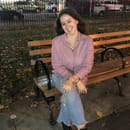Have you ever realized that you just can’t fall asleep after going on your phone before bed? Technology is a dangerous and accessible game in the modern age. Research from Harvard Health’s “Blue light has a dark side” illustrates that blue wavelengths of light found in electronic screens are “beneficial during daylight hours because they boost attention, reaction times, and mood— [but] seem to be the most disruptive at night” (Publishing, 2018). Blue light can not only disturb sleep patterns, but nighttime exposure can also pose serious threats to one’s overall health. In fact, those who receive too much blue light exposure at night tend to have higher risks of cancer, diabetes, heart disease, and obesity because said exposure can offset a person’s circadian rhythm and melatonin secretion.
Even so, college students are all-too accustomed to blue light. Most stay up into the wee hours of the morning to study, staring at computer screens and then, just before bed, at their phones. Despite this repeated behavior, most college students understand the difficulty in maintaining healthy sleeping patterns because of constant screen exposure. A Fordham University student, Nan Rittenhouse, recently shared her over-the-summer experiences with blue light. Every day, she would stare at a laptop screen for nine hours during her internship, in addition to staring at her phone and television. Rittenhouse took note of her exposure to blue light at her internship versus her other job for which it was not required to use screens. She noticed headaches and significantly less sleep after her first internship in comparison to better days and nights after her job. As she understands it, “It took me a while to realize that it was really the screen affecting me.”
Rittenhouse, like many others looking for better sleep, caught wind of glasses which help protect against blue light. She saw an Instagram ad for Felix Greys glasses, which priced blue-light blocking eyewear for about $100. However, she decided to buy a similar brand, Pixel, for $10 less and ended up paying around $85. Even so, one need not sacrifice style for a good bargain, as both companies have many options based on preference. As Rittenhouse herself reports, “I find them so helpful and the headaches and insomnia from screens go away when I use the glasses!”
Harvard Health also shares a study endorsing the purchase of blue-light-blocking glasses. In one study, researchers at the University of Toronto designed an experiment to compare the melatonin levels of people who wore the glasses while exposed to bright indoor light to levels reported by those exposed to regular dim light without wearing the glasses (Publishing, 2018). Because the melatonin levels were about the same despite varying degrees of luminance, researchers contend that these results “strengthen the hypothesis that blue light is a potent suppressor of melatonin” (ibid). Therefore, those who constantly expose themselves to light at night, such as students or night-shift workers, could reap the sleep benefits of wearing protective glasses specifically designed to block blue light.
Publishing, H. (2018). Blue light has a dark side – Harvard Health. [online] Harvard Health. Available at https://www.health.harvard.edu/staying-healthy/blue- light-has-a-dark-side [Accessed 24 Sep. 2018].


